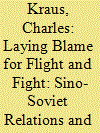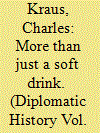| Srl | Item |
| 1 |
ID:
166878


|
|
|
|
|
| Summary/Abstract |
In spring 1962, 60,000 individuals fled from northern Xinjiang into the Soviet Union. Known as the “Yi–Ta” incident, the mass exodus sparked a major flare up in Sino-Soviet relations. This article draws on declassified Chinese and Russian-language archival sources and provides one of the first in-depth interpretations of the event and its aftermath. It argues that although the Chinese government blamed the Soviet Union for the Yi-Ta incident, leaders in Beijing and Xinjiang also recognized the domestic roots of the disturbance, such as serious material deficits in northern Xinjiang and tensions between minority peoples and the party-state. The Chinese government's diplomatic sparring with Moscow over the mass exodus reflected Mao Zedong's continued influence on Chinese foreign policy, despite claims by scholars that Mao had retreated from policymaking during this period.
|
|
|
|
|
|
|
|
|
|
|
|
|
|
|
|
| 2 |
ID:
164275


|
|
|
|
|
| Summary/Abstract |
The beverage and cultural icon known as Coca-Cola returned to the People’s Republic of China (PRC) in January 1979. The month prior, the Coca-Cola Company and the Chinese government had brokered a bombshell agreement, which ended a thirty-year ban on the beverage on the Chinese mainland.1 Bringing the world’s most popular soft drink back to the world’s most populous country, the deal appeared telling of the positive state of Sino-American relations and China’s political and economic trajectory.2 The two countries had just formally established diplomatic relations and were intent on further consolidating ties, while Deng Xiaoping, having risen to preeminence within the Chinese Communist Party (CCP), was rolling out much needed reforms for his country’s economy.
|
|
|
|
|
|
|
|
|
|
|
|
|
|
|
|